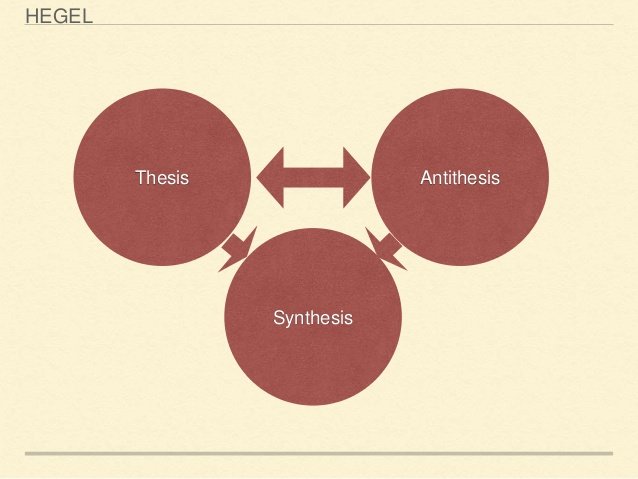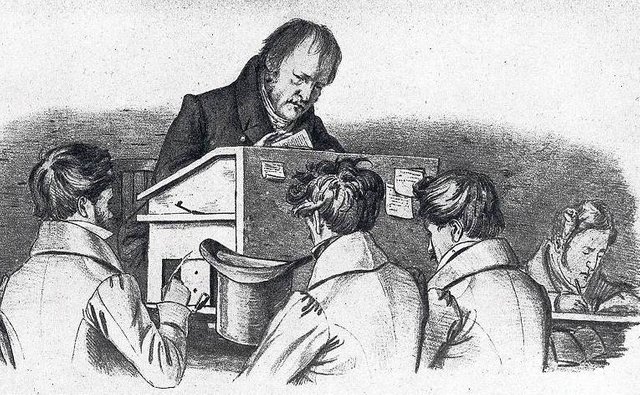The Hegelian Dialectic: An Explaination
One of the most infamous concepts in philosophy is the Hegelian dialectic. It is named after the most famous philosopher from a movement called “German Idealism”, Georg Wilhelm Friedrich Hegel(1770-1831). It can be argued that the concept was introduced by another philosopher of the same movement Johann Gottlieb Fichte(1762-1814) but they both had a different interpretation of what it means. Hegel started developing his idea of the dialectic in his book “Science of Logic”, published between 1812 and 1816.
What does dialectic mean?
Dialectic is a term that has been used by many different philosophers with many different meanings. You can make a distinction between three common meanings of the word dialectic:
Dialectic can be one’s basic philosophy
The research of ideas was called dialectic
A certain way of thinking and drawing conclusions
Hegel’s idea of the dialectic can be put in the third category. It is a concept for how to arrive at conclusions. In Hegel’s philosophy the observer is not only someone that observes an objective reality and is disconnected from it but also someone that influences reality by observing it. This is why the way humans think does not only give us information about the human mind but for Hegel it shows us a lot about the essential questions of being which is why the exploration of patterns in our thinking was so important for Hegel’s philosophy.

(img source: https://www.geopolitica.ru/sites/default/files/)
Hegel’s dialectic
When Hegel talks about dialectic he refers to a model of reasoning that always consists of three components: thesis, antithesis and the synthesis. The thesis is the original idea, the root and the starting point of the thought process. Hegel then assumes that for every thesis you can also formulate an antithesis, which is the direct opposite of the thesis. This is where the thought process finds place. Both, the thesis and the antithesis, are in some sense true which mean they both contain some part of the whole truth. Out of these two components results a synthesis which aims to encompass both the true elements from the thesis and the true elements from the antithesis. This synthesis now represents the whole truth while the thesis and the antithesis only contained partial truth. “The truth is the whole” (The Phenomenology of Spirit, 1807) is one quote from Hegel that reflects this idea that the whole truth is not only made up from either the thesis nor the antithesis but from both just like the synthesis is made up from parts of the thesis and parts of the antithesis. The diagram below is a visual representation of the dialectic way of thinking.

(img source: https://image.slidesharecdn.com )
This result of thinking, the synthesis, can be the starting thesis of a new thinking process. To this new thesis you can formulate a new antithesis that results in a new synthesis. This process can then happen again and again. This is the way our whole thinking process works, it starts with a thesis that becomes a synthesis after a dialectic process that itself is the starting point of a new dialectic process. But you can not think of this process as a process of isolated steps. The steps are connected, the transitions are fluid.
Examples
It’s easiest to understand the Hegelian dialectic when looking at an example of how to apply it. Hegel provides a very interesting example in his “Phenomenology of Spirit” that also reveals a lot about his philosophy as a whole, it covers our self-perception. I start by noticing myself as me itself, this is the thesis. After that I see myself as different to my surroundings, this is the antithesis to seeing me as me itself. The synthesis of this thesis and the antithesis is the way I perceive myself in reality. I see myself both as what makes me different from others and also as what makes me me.
Another example by Hegel is the way he interpreted the whole history as a dialectic process. The first thing to exist is spirit, pure logic without any matter, this is the thesis. The antithesis of the spirit is matter. The synthesis of spirit and matter is humanity which is most prevalent in our culture, the arts and philosophy. We are in one way matter, our body and the molecular composition of it, and in another way spirit, in our thinking and reasoning.

(img source: https://www.tagesspiegel.de/images/)
Are you interested in the concept of a universal basic income? Check out my latest article where I discuss this idea:
https://steemit.com/philosophy/@apartphilosopher/universal-basic-income-what-it-is-and-how-it-could-be-implemented
Crypto related links:
Coinbase: https://www.coinbase.com/join/5a889b233b336a0439b57b8c
( Invest 100$ and get 10$ in Bitcoin for free )
Binance: https://www.binance.com/?ref=26166506
Mannacoin: https://www.mannabase.com/?ref=ac22f0d1c7
( Get Manna coins every week for free! )

Everyone that upvotes and comments on this post will enter a giveaway and have the opportunity to win some SBD. The winner will be chosen randomly will always be announced on the next post.
The winner of the last post is: @cryptictruth

I studied Hegel for about 4 years in Germany and wrote my master thesis about the Science of Logic. I agree with most of what you are saying although I have the feeling you are simplyfying some things.
For example: Hegel did the basic work for the late science of the logic already in the encyclopedia of the philosophical sciences. In here he layed the ground work for what later became famous as the trinity of thesis, antithesis and synthesis.
It is called the "three moments of the logic-realistic" and contains a reasonable moment ("thesis"), the dialectical moment ("antithesis") and the speculative moment ("synthesis").
I strongly recommend reading these in order to truly understand what Hegel's dialectic is all about. Dialectic thinking means to negate a negation. It means to having not truly experienced an idea, but to have at least experienced it in one of its determinations. The act of speculation (the way to the "antithesis") means to deny the actual possibility to beeing able to recognize something solely by reasonable thinking, but to acknowledge that the idea beeing researched about is differentiated within itself.
I do not agree on the last paragraph. Can you give a reference please where Hegel speaks about the synthesis of spirit and matter?
I am asking, because in a commented copy of the "Science of Logic" we used in university, Hegel writes:
(Source: Georg Wilhelm Friedrich Hegel: Werke in 20 Bänden mit Registerband, herausgegeben von Eva Moldenhauer und Karl Markus Michel, Band 5: 127)
(Original: Solches seiner Bestimmung nach Andere ist die physische Natur; sie ist das Andere des Geistes… Aber indem der Geist das wahrhafte Etwas und die Natur daher an ihr selbst nur das ist, was sie gegen den Geist ist, so ist, insofern sie für sich genommen wird, ihre Qualität eben dies, das Andere an ihr selbst, das Außer-sich-Seiende … zu sein.).
In my view Hegel clearly speaks of a hierarchy here. He is putting the mind above the matter. The mind is "the true something" and the nature is "only what it is in opposite of the spirit". Or did I misunderstand this?
I always thought Hegel thought strictly dualistical as Platon did. Maybe I am wrong. Therefore I am asking you for reference.
Thanks for your input, the synthesis of spirit and matter is described in the "Encyclopaedia of the Philosophical Sciences" (Enzyklopädie der philosophischen Wissenschaften im Grundrisse), unfortunetly I can't find my original notes so I can't tell you the specific passage.
I would say that Hegel is definetly dualistical and he puts the mind above matter. When he describes god as the world spirit and god is above everything else, then you can conclude that there is a hierarchy where the spirit is above the matter. The way I understand the synthesis of spirit and matter is that humans are in one way spirit but unlike god they are also matter but not in a way that there is a unity of the mind and the body, they are still somewhat independent.
I am in no way an expert on this topic so it is not unlikely that I misunderstood or simplified some aspects, if you wrote your master thesis on the Science of Logic you know much more about this than me, so I wouldn't take me as a reference.
In my view Hegel either was wrong with the dualistic thinking of mind and matter or people misunderstood him. Because right now we live in disastrous times, wherein the ideology of "mind over matter" became a perverted thinking, stating, that the matter "the male and/or white human" is arranged above "the female and/or black human".
In my personal view this kind of thinking is one of the major reasons for many global issues such as exploitation of nature and exploitation of people (i.e. human trafficking).
I once believed everything I learned about Hegel until I started reading about the critics of patriarchy.
Both, Hegels philosophy about the absolute respectively his philosophy of science and the critics of patriarchy, have the same foundation: mind and matter. Both terms are very important for my thinking and I researched a lot about the critics of patriarchy after I finished my degree in Germany. I concluded that something is wrong about the dualism between mind and matter. Maybe people missunderstood it in a way some "Neo-Darwinists" missunderstood Darwin. Darwin might have said "survival of the fittest", but what he meant was "survival of the one best adapted". There is a difference in that. Maybe people did the same with Hegel.
If they did (I'm still not sure), than Hegel is a bit responsible aswell, speaking of god referring to a male entity in his readers view. Both, putting mind over matter (in my view they're egalitarian or at least NOT directly connected with a certain sex) and refering to the male god must have laid the ground work for what manifested in a clearly dualistic thinking we face all around the world.
Good explanation of a tricky and misunderstood idea. Also, you get a bonus upvote for actually talking about Hegel, and not claiming that the Hegelian dialectic is a NWO conspiracy to control the masses.
Thank you, I tried to find the right words for describing it. You are right, the amount of bullshit you will find when googling the Hegelian dialectic is mind blowing.
@apartphilosopher Good post. Right to the point, which I like. Information/knowledge that I am just now discovering for the first time. Thanks for sharing it.
Thank you a lot, I am glad you liked my post and learned something new.
Resteemed your article. This article was resteemed because you are part of the New Steemians project. You can learn more about it here: https://steemit.com/introduceyourself/@gaman/new-steemians-project-launch
Nice post, I already knew about the Hegelian dialectic but the examples were very interesting.
Thank you, I tried hard to find interesting examples that tell something about Hegel's world view and also show the way the dialectic works.
I thought the origin of dialectic was dialog, speech and counter speech. Somebody says A, somebody else Non-A, like in Dialogs of Platon.
But Hegels Dialektic is a Negation of formal Logic. It is integrating contratiction, "pure negativity", it is a"speculative Logic". Thats why, in my opinion, you have to understand first this speculative Logic. Just in case you want to avoid the danger of trivialisation.
Your article is a good starting point for discussion!
Congratulations! This post has been upvoted from the communal account, @minnowsupport, by apartphilosopher from the Minnow Support Project. It's a witness project run by aggroed, ausbitbank, teamsteem, theprophet0, someguy123, neoxian, followbtcnews, and netuoso. The goal is to help Steemit grow by supporting Minnows. Please find us at the Peace, Abundance, and Liberty Network (PALnet) Discord Channel. It's a completely public and open space to all members of the Steemit community who voluntarily choose to be there.
If you would like to delegate to the Minnow Support Project you can do so by clicking on the following links: 50SP, 100SP, 250SP, 500SP, 1000SP, 5000SP.
Be sure to leave at least 50SP undelegated on your account.
Quite interesting philosophy, I haven't heard about it before, but some elements of it remind me of the double-slit experiment. especially when you said the observer can influence reality just by observing it.